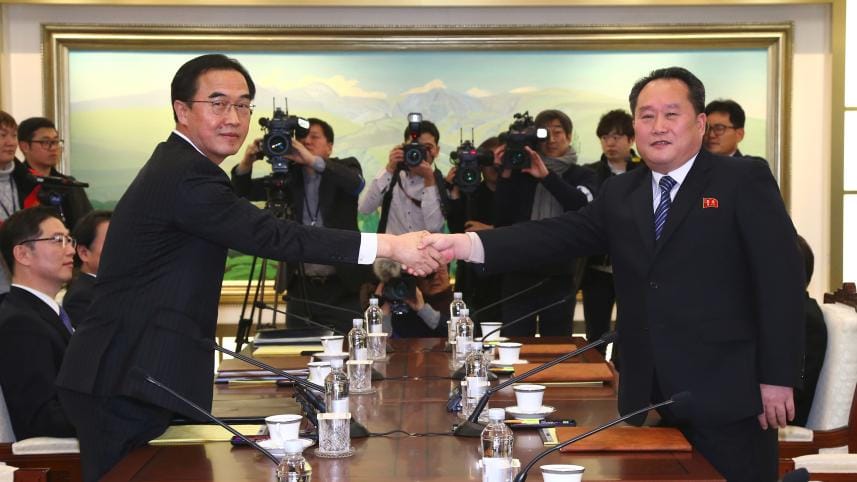Opening New Horizons

The 23rd Olympic Winter Games is going to be held in PyeongChang, Republic of Korea from February 9 to 25 for 17 days. Besides being the first ever Winter Olympic Games to be hosted by Korea, it is also the first Olympic Games to be held in Korea in 30 years, after its first and last Seoul Summer Olympics in 1988. This time, Korea is going to demonstrate yet another spectacular event we had last witnessed in 1988 by opening the New Horizons in winter sports.
It was not easy for Korea to become an advanced country that could apply technology to international sports games. Ravaged by the Korean War (1950-1953), the country had long been dependent on foreign aid. However, over three decades, Korea attained an average growth rate of 9 percent, achieving the true "Miracle on the Han River".
When Korea hosted the Summer Olympic Games on its soil for the first time, it was a historic and touching moment for Korea. The Seoul Olympic Summer Games was a great opportunity to present Korea's successful development of economy and democracy to the world. Moreover, it has taught Koreans about the values of the Olympic Movement and spirits of unity and peace. Thirty years after the Seoul Olympics, Korea is going to produce another historic moment in February, this time showing Korea's further progress on not only the economy but also on the matureness of its society since the last Olympic Games.
The 2018 PyeongChang Olympic Winter Games will launch four New Horizons—cultural, environmental, geographical and economic—in winter sports in Asia. It is going to write another chapter in the history of the Olympic Games by becoming a model for international culture, boosting green growth and national economy. Moreover, North Korea's recent decision to join the PyeongChang Games with the Republic of Korea under the name of "Korea" and under the "Flag of Unification" represents the true values of the Olympic Movement that are underpinned by excellence, friendship and respect. Through sports, we are united; through sports, we are one step closer to a peaceful and better world.
The PyeongChang Games will be the first ever Olympic Winter Games with over 100 gold medals. It will also be the stage for the greatest number of women's and mixed events in the history of the Olympic Winter Games. Twenty-two-thousand-four-hundred volunteers, selected out of 91,000 applicants will support the games and athletes, and about 3,650 delegates from 45 countries will take part in the PyeongChang Games. Having hosted international sports games previously, Korea has hands-on operational experience on the field of play and other services such as transportation, volunteer operations, ticket sales, and cooperation with authorities.
Great strides have also been taken to build new infrastructure for visitors to Korea. Of 12 competition venues, six are newly built, and non-competition venues such as the Olympic Plaza, the Olympic/Media Villages, and the International Broadcasting Centre have been constructed. New high-speed railways have been built to facilitate travel between Seoul and PyeongChang. The travel time has now reduced from three hours to one hour from Seoul to PyeongChang, and from Incheon International Airport to PyeongChang it only takes 98 minutes. Further, the PyeongChang Games will introduce 5G Internet services, cutting-edge holograms, personalised IoT (Internet of Things) services and other ICT technologies that have never been seen in the Olympic Games before.
Most prominently, as part of Korea's leadership initiative to promote winter sports in Asia and in countries without cold climate, PyeongChang has been organising "The Dream Program" every year since 2004. Offering young participants the opportunity to experience winter sports, to date, over 1,700 young people from 80 countries have participated in the programme, out of which 179 youths have proudly gone on to compete in international winter sports games. Even Bangladesh has participated in the programme two times, in 2016 and 2017. Although the Bangladeshi participants could not join the Olympic Games this time, I hope the Dream Program has provided them with a dream to participate in the Olympics in the near future.
It is apparent from Korea's development history that Korea was never a country that could dare to dream of hosting an international game, let alone the Olympic Games. However, defying all odds and challenges, Korea became a global sporting nation that has hosted four major international sports games: the 1989 Seoul Summer Olympic Games, the 2002 FIFA World Cup, the 2011 Daegu IAFF World Championships in Athletics, and the upcoming 2018 PyeongChang Winter Olympic Games.
I have a firm belief that Bangladesh is also a country similar to Korea which has a latent potential to become an advanced economy in the next decades. Bangladesh has an expected average growth rate of 6.7 percent for the next three years, and is graduating from the Least Developed Countries status this year. Bengal's great Nobel laureate Rabindranath Tagore once described Korea as the "lamp of the east". But I think the time has finally come for Bangladesh to take over the lamp and begin to be lighted once again as "Sonar Bangla".
As Korea is all set to launch the PyeongChang Olympic Games in February, the interest and support of the people of Bangladesh will be significant to our friendship as well as to the successful organisation of the Games. Korea is a time-tested unique friend of Bangladesh who has been, and will always stand next to Bangladesh in assisting the socio-economic development of Bangladesh. Marking 45 years of diplomatic friendship between Korea and Bangladesh this year, I am very excited to see the strengthening bond between our two countries in the next years. With Korea's continued cooperation, Bangladesh will attain the capacity to nurture young sports athletes before long, who will make Bangladesh proud by bringing home medals from the Olympics Games.
HE Ahn Seong-doo is Ambassador of the Republic of Korea to Bangladesh.




Comments